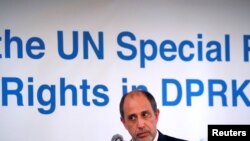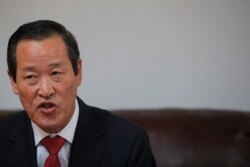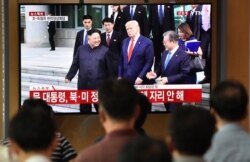Seoul sent the wrong message to Pyongyang by declining to co-sponsor a resolution that the U.N. General Assembly passed on human rights violations of North Korea, said a U.N. human rights expert.
Tomas Quintana, U.N. special rapporteur on human rights in North Korea, said, "It [sends] a message that implies that human rights, the importance of respecting and protecting human rights of the people in North Korea, is something that comes second" to Seoul's effort to build a relationship with Pyongyang.
He continued, "It's not the best message to North Korea because North Korea might feel that [it] can always use human rights as a leverage for negotiations, and that's something I don't believe that can be done."
The U.N. General Assembly passed a resolution condemning North Korea's "long-standing and ongoing systematic, widespread, and gross violation of human rights" by consensus without a vote Wednesday.
North Korea's U.N. Ambassador Kim Song rejected the resolution. He told the General Assembly that the resolution has "nothing to do with the genuine promotion and protection of human rights as it is an impure product of political plots by hostile forces that seeks to tarnish the dignity and image of the DPRK and overthrow our social system."
The DPRK stands for the Democratic People's Republic of Korea, an official English name for North Korea.
The resolution was sponsored by 60 countries including the U.S. This year, South Korea declined to co-sponsor it for the first time since 2008, when it started the sponsorship of an annual resolution calling out North Korea on its human rights violations.
Seoul made the decision to turn down co-sponsoring it in November when a draft resolution was being prepared.
International human rights groups as well as 76 nongovernmental groups, coalitions and individuals from 22 countries, including Quintana, sent a joint letter to South Korean President Moon Jae-in, urging him to stand up for human rights in North Korea.
Human rights experts said they have not received any responses so far from the Moon government.
"We're being ignored," said Greg Scarlatoiu, executive director of the Committee for Human Rights in North Korea (HRNK). "We're getting the cold shoulder. This is coming from a president who used to be introduced as a human rights lawyer. This is beyond embarrassing and beyond incomprehensible."
Moon began his political career as a human rights and civil rights lawyer.
Phil Robertson, deputy director of the Asia Division for Human Rights Watch, thinks Moon is trying to appease North Korean leader Kim Jong Un in his attempt to continue diplomacy with Pyongyang.
"I think that Moon Jae-in is so afraid of somehow offending Kim Jong Un," said Robertson. "He's bending over backwards to do anything he can to try to get Kim Jong Un to come back to the table."
Inter-Korean dialogue that began in 2018 has been stalled as Pyongyang refused to engage with Seoul after its talks with Washington broke down in February at the Hanoi summit.
Back in August, North Korea said it was "senseless" to think inter-Korean talks would resume when it was expressing its displeasure of joint military drills South Korea held with the U.S.
Robertson thinks South Korea should play a leading role in demanding North Korea respect human rights of its people with a long-term goal of unification in mind.
"Ultimately, South Korea and North Korea will come together," said Robertson. "And any human rights issues in North Korea will have to be addressed. By trying to run and hide from human rights, I think that Moon Jae-in is doing a disservice not only to South Koreans but also to North Korans as well."
Robertson said the resolution adopted by the U.N. General Assembly sends an important reminder to the world that North Korea is a human rights abuser.
The resolution "offers important moral clarity and also political support for the ongoing effort to pressure North Korea to improve human rights," said Robertson. "It shows that the international community is not prepared to acquiesce to the denials and to the fabrication by the government in Pyongyang about their human rights situation."
According to Scarlatoiu, the North Korean regime has been repressing its people through the denial of basic freedoms such as speech and religion, as well as through the intentional use of torture and execution in order to stay in power.
"This is the only way they know how to run their system," said Scarlatoiu. "The regime stays in power through a deliberate policy of human rights denial."
Robertson said, however, information getting into North Korea has helped empower people to realize their government is denying rights that are available outside the country.
"When information comes in from overseas, that provides new ideas," said Robertson. "It provides new perspectives. These are the sort of things that the government of North Korea fears, and this is why they've tried to crack down on anybody trying to bring in information into North Korea from outside sources."
He continued, "When we talk about trying to change the situation in North Korea, really what has changed so far is that no one believes [the government's] propaganda anymore that the Kim family are gods on Earth and that the Juche idea [of self-sufficiency] is the best idea in the world."
Three dynasties of the Kim family, starting with the current leader's grandfather, Kim Il Sung, founder of North Korea, and his father Kim Jong Il, the second leader, have ruled North Korea with totalitarianism since the early 1950s.
Lee Yeon-cheol contributed to this report.







